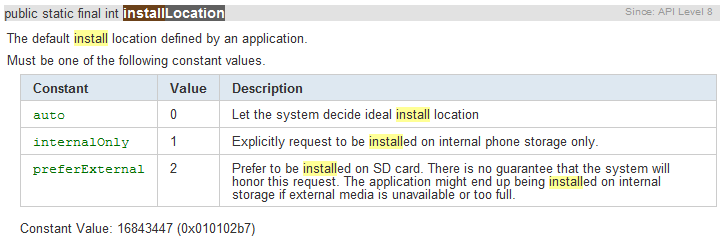我们在使用Android手机时发现,有的程序允许被移动到SD卡,而有的不行?这是为什么呢?
因为在Android 2.2版之后, Android应用才被允许移动到SD卡中。而在此之前开发的应用,全部没有这个功能。
那么究竟如何允许你的应用移动到SD卡呢?答案其实很简单,只要给Manifest设置一个installLocation属性即可。
这个属性设置的是默认安装位置, 共有三个有效值,auto、internalOnly、preferExternal。
auto 表示自动,由系统决定安装位置
internalOnly 安装在手机内存
preferExternal 安装在外部存储中

看一下修改后的AndroidManifest.xml。
- <manifest xmlns:android="http://schemas.android.com/apk/res/android"
- package="com.yfz"
- android:installLocation="auto"
- android:versionCode="1"
- android:versionName="1.0">
是不是很简单?
可能有人会问,如果我的还要支持2.1怎么办呢? 其实不用管啦,你只要设置 <uses-sdk android:minSdkVersion="7" /> 然后安装到2.1的设备上时,Android会忽略这个属性,直接给你安装到手机内存。
需要额外注意的是,并不是所有程序都适合移到SD卡上。下面就看一下,在哪些条件下,不建议允许程序移动到SD卡上。
- Applications That Should NOT Install on External Storage
- When the user enables USB mass storage to share files with their computer (or otherwise unmounts or removes the external storage), any application installed on the external storage and currently running is killed. The system effectively becomes unaware of the application until mass storage is disabled and the external storage is remounted on the device. Besides killing the application and making it unavailable to the user, this can break some types of applications in a more serious way. In order for your application to consistently behave as expected, you should not allow your application to be installed on the external storage if it uses any of the following features, due to the cited consequences when the external storage is unmounted:
- Services
- Your running Service will be killed and will not be restarted when external storage is remounted. You can, however, register for the ACTION_EXTERNAL_APPLICATIONS_AVAILABLE broadcast Intent, which will notify your application when applications installed on external storage have become available to the system again. At which time, you can restart your Service.
- Alarm Services
- Your alarms registered with AlarmManager will be cancelled. You must manually re-register any alarms when external storage is remounted.
- Input Method Engines
- Your IME will be replaced by the default IME. When external storage is remounted, the user can open system settings to enable your IME again.
- Live Wallpapers
- Your running Live Wallpaper will be replaced by the default Live Wallpaper. When external storage is remounted, the user can select your Live Wallpaper again.
- Live Folders
- Your Live Folder will be removed from the home screen. When external storage is remounted, the user can add your Live Folder to the home screen again.
- App Widgets
- Your App Widget will be removed from the home screen. When external storage is remounted, your App Widget will not be available for the user to select until the system resets the home application (usually not until a system reboot).
- Account Managers
- Your accounts created with AccountManager will disappear until external storage is remounted.
- Sync Adapters
- Your AbstractThreadedSyncAdapter and all its sync functionality will not work until external storage is remounted.
- Device Administrators
- Your DeviceAdminReceiver and all its admin capabilities will be disabled, which can have unforeseeable consequences for the device functionality, which may persist after external storage is remounted.
- Broadcast Receivers listening for "boot completed"
- The system delivers the ACTION_BOOT_COMPLETED broadcast before the external storage is mounted to the device. If your application is installed on the external storage, it can never receive this broadcast.
- Copy Protection
- Your application cannot be installed to a device's SD card if it uses Android Market's Copy Protection feature. However, if you use Android Market's Application Licensing instead, your application can be installed to internal or external storage, including SD cards.
- If your application uses any of the features listed above, you should not allow your application to install on external storage. By default, the system will not allow your application to install on the external storage, so you don't need to worry about your existing applications. However, if you're certain that your application should never be installed on the external storage, then you should make this clear by declaring android:installLocation with a value of "internalOnly". Though this does not change the default behavior, it explicitly states that your application should only be installed on the internal storage and serves as a reminder to you and other developers that this decision has been made
上面这段一定要看,很重要。 比如你的程序如果想开机自启动,那就一定不能允许移动到SD卡了。 因为开机启动的广播消息BOOT_COMPLETE在 SD 卡被装载之前就发出来了,程序根本没法收到。
好了,就写这么多了。
更多内容可以看这里: http://www.cnblogs.com/over140/archive/2011/03/21/1989891.html